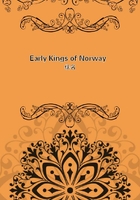
第38章
As for Harald Hardrade, "Harald the Hard or Severe," as he was now called, Tosti's proposal awakened in him all his old Vaeringer ambitious and cupidities into blazing vehemence. He zealously consented; and at once, with his whole strength, embarked in the adventure. Fitted out two hundred ships, and the biggest army he could carry in them; and sailed with Tosti towards the dangerous Promised Land. Got into the Tyne and took booty; got into the Humber, thence into the Ouse; easily subdued any opposition the official people or their populations could make; victoriously scattered these, victoriously took the City of York in a day; and even got himself homaged there, "King of Northumberland," as per covenant,--Tosti proving honorable,--Tosti and he going with faithful strict copartnery, and all things looking prosperous and glorious. Except only (an important exception!) that they learnt for certain, English Harold was advancing with all his strength; and, in a measurable space of hours, unless care were taken, would be in York himself. Harald and Tosti hastened off to seize the post of Stamford Bridge on Derwent River, six or seven miles east of York City, and there bar this dangerous advent. Their own ships lay not far off in Ouse River, in case of the worst. The battle that ensued the next day, September 20, 1066, is forever memorable in English history.
Snorro gives vividly enough his view of it from the Icelandic side: A ring of stalwart Norsemen, close ranked, with their steel tools in hand; English Harold's Army, mostly cavalry, prancing and pricking all around; trying to find or make some opening in that ring. For a long time trying in vain, till at length, getting them enticed to burst out somewhere in pursuit, they quickly turned round, and quickly made an end, of that matter. Snorro represents English Harold, with a first party of these horse coming up, and, with preliminary salutations, asking if Tosti were there, and if Harald were; making generous proposals to Tosti; but, in regard to Harald and what share of England was to be his, answering Tosti with the words, "Seven feet of English earth, or more if he require it, for a grave." Upon which Tosti, like an honorable man and copartner, said, "No, never; let us fight you rather till we all die." "Who is this that spoke to you?" inquired Harald, when the cavaliers had withdrawn. "My brother Harold," answers Tosti; which looks rather like a Saga, but may be historical after all. Snorro's history of the battle is intelligible only after you have premised to it, what he never hints at, that the scene was on the east side of the bridge and of the Derwent; the great struggle for the bridge, one at last finds, was after the fall of Harald; and to the English Chroniclers, said struggle, which was abundantly severe, is all they know of the battle.
Enraged at that breaking loose of his steel ring of infantry, Norse Harald blazed up into true Norse fury, all the old Vaeringer and Berserkir rage awakening in him; sprang forth into the front of the fight, and mauled and cut and smashed down, on both hands of him, everything he met, irresistible by any horse or man, till an arrow cut him through the windpipe, and laid him low forever. That was the end of King Harald and of his workings in this world. The circumstance that he was a Waring or Baring and had smitten to pieces so many Oriental cohorts or crowds, and had made love-verses (kind of iron madrigals) to his Russian Princess, and caught the fancy of questionable Greek queens, and had amassed such heaps of money, while poor nephew Magnus had only one gold ring (which had been his father's, and even his father's _mother's_, as Uncle Harald noticed), and nothing more whatever of that precious metal to combine with Harald's treasures:--all this is new to me, naturally no hint of it in any English book; and lends some gleam of romantic splendor to that dim business of Stamford Bridge, now fallen so dull and torpid to most English minds, transcendently important as it once was to all Englishmen. Adam of Bremen says, the English got as much gold plunder from Harald's people as was a heavy burden for twelve men;[18] ([18] Camden, Rapin, &c. quote.) a thing evidently impossible, which nobody need try to believe. Young Olaf, Harald's son, age about sixteen, steering down the Ouse at the top of his speed, escaped home to Norway with all his ships, and subsequently reigned there with Magnus, his brother. Harald's body did lie in English earth for about a year; but was then brought to Norway for burial. He needed more than seven feet of grave, say some; Laing, interpreting Snorro's measurements, makes Harald eight feet in stature,--I do hope, with some error in excess!